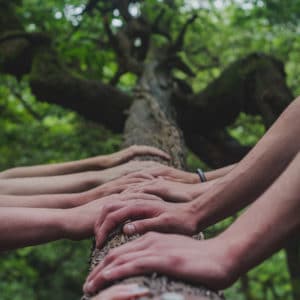5 social businesses that will inspire you
Fostering the integration of refugees into the job market, preserving social diversity, reducing unemployment, revitalizing employment through upcycling, reviving craftsmanship while promoting education... Social initiatives have multiplied in recent years in the face of these numerous challenges. In this article, we introduce you to 5 social businesses that combine entrepreneurship and impact.
1. Café joyeux puts people with disabilities at the heart of society
It is the first franchise of coffee shops in France that employs people with intellectual disabilities and reinvests all profits into the cause defended by the company. Supervised by staff specifically trained for this purpose, Joyeux colleagues are thus integrated into a "non-specific" work environment where they interact with the usual clientele of downtown cafes. This approach significantly promotes their integration and autonomy and very positively changes the perspective of customers on disability. After 3 years of existence, Café Joyeux has expanded the concept by opening other cafes in France. The company's objective is to create a springboard for people with disabilities towards new professional horizons in mainstream environments, thanks to a certification diploma.
2. Meet My Mama reveals culinary talents
Professionally valorizing the culinary talent of women from immigrant backgrounds and empowering them to become economically independent through their activity are the missions of the company Meet My Mama. Established in 2018, it has supported over 300 passionate cooks, refugees, expatriates, or immigrants, to become chefs and create their own businesses. Meet My Mama includes 3 types of activities: catering, an academy, and support to enable women to share their cultures through authentic, homemade recipes and turn their passion into their profession.
3. La Vie est Belt proves that recycling is profitable
As a student engineer, he tinkered with belts made from recycled tires. Hubert Motte then founded La Vie est Belt, an ethical and eco-friendly company specializing in belts and accessories made from recycled materials. Its products are manufactured in Hauts de France by people with disabilities. The revalued materials come from bicycle tires, climbing ropes, fire hose pipes, sheets, and worn-out inner tubes. From material recovery to product manufacturing, everything is done locally, with suppliers located within 200 km of the workshop in Roubaix. In its approach, La Vie est Belt advocates for a more responsible use of natural resources and aims to demonstrate that it is possible while ensuring the profitability of the company.
4. Fairphone wants to revolutionize the electronics industry
While the electronics industry is booming, the environmental impact of its giants is disastrous. The manufacturing conditions of these technological products are questionable, if not completely opaque. Fairphone, a social enterprise working towards a more ethical and responsible electronics industry, right down to the production and supply chain. Their goal is not only ethically manufacturing smartphones but also combating planned obsolescence: all their devices are easily repairable, and spare parts are provided by the company. A unique concept in the industry! With 5 years of existence, the activist mobile manufacturer has proven itself by surpassing the 200,000 units sold mark, and especially by completing an unprecedented crowdfunding campaign in the history of the Netherlands: raising 2.5 million euros, for a target set at one million, which will allow the company to broaden its visibility and optimize its social impact.
5. Label Emmaus digitalises solidarity and reuse
Created by two employees of Emmaus in France, Label Emmaus aims to be an ecological and solidarity alternative to online retail giants. Structured as a cooperative, Label Emmaus continues the mission of the Emmaus network: training precarious and marginalized individuals for the jobs of tomorrow and promoting their social and professional integration. In line with the movement's DNA, Label Emmaus modernizes the image of fair trade commerce and contributes to the digital transition of an entire sector, the Social and Solidarity Economy, by offering for sale revalued, reconditioned items, and recycled materials. Between 2016 and 2022, over a million items have been saved from the dumpster through the cooperative's activities, including 26 tons of books and 43 tons of office furniture.
Would you like more examples and testimonials from social entrepreneurs sharing their experiences? Visit here to get plenty of ideas and feed your creativity!
You liked this content? Share it now!





